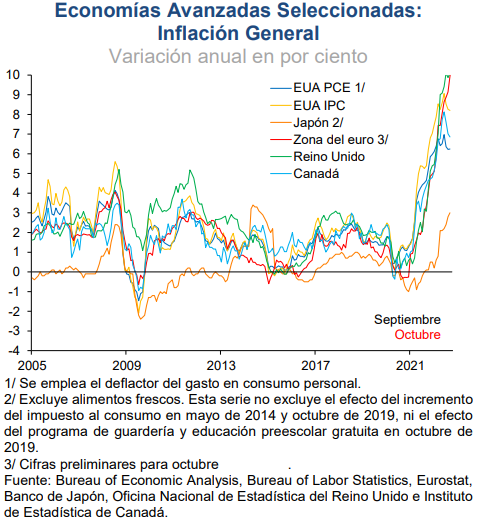World inflation continued to be high, remaining at levels not seen in decades in some of the main economies, according to Banco de México (Banxico).
This has continued to reflect price pressures in a wide range of items, derived from the ongoing imbalance between the recovery of demand and supply in various markets.

It also responded to high global benchmark food and energy prices.
However, according to the minutes of Banxico’s Board of Governors meeting on the occasion of the monetary policy decision announced on November 10, 2022, pressures on commodity prices and disruptions in global supply chains have shown signs of easing.
Banxico implements an inflation targeting scheme as a framework for conducting monetary policy, which permanently targets an annual increase in the National Consumer Price Index (NCPI) of 3%, with a variability interval of plus or minus one percentage point.
World inflation
In some of the major advanced economies, the recent moderation in energy inflation has been reflected in a decline in headline inflation.
Nevertheless, in most of these economies headline inflation remains significantly above their central banks’ targets, while core inflation has continued to rise.
In the United States, headline consumer price index inflation declined slightly from an annual rate of 8.3% in August to 8.2% in September, remaining at an elevated level.
This decline mainly reflected a reduction in energy and food inflation.
In contrast, core inflation increased from 6.3% to 6.6%, reaching its highest level since 1982.
Personal consumption expenditure deflator inflation remained unchanged at 6.2% year-over-year between August and September, while core inflation rose from 4.9% to 5.1% in the same period.
Outlook
Analysts’ short-term inflation forecasts remain at elevated levels.
In contrast, long-term expectations, based on financial instruments, show little change in most advanced economies.
In many emerging economies, headline inflation continued to rise.
Moreover, it remains well above their central banks’ targets.
However, in some countries, the latest data show a slight slowdown.
The rise continues to be driven largely by energy and food prices. It is also driven by the rise in core inflation.
In some cases, the depreciation of local currencies has exacerbated the problem.
Although energy prices have shown some moderation, headline inflation remains high.
Against this backdrop, central banks in major advanced economies have continued to raise their benchmark interest rates.

